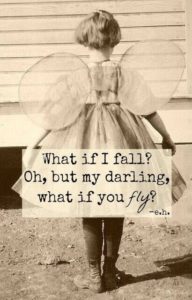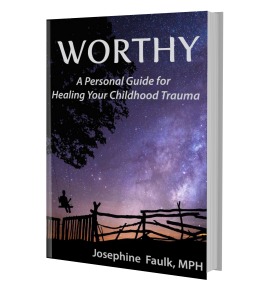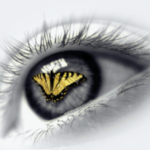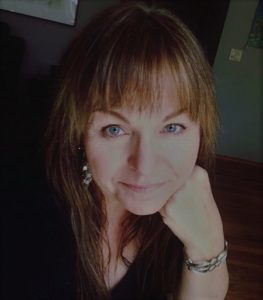The First Step in Overcoming Childhood Trauma
 It has everything to do with why forming healthy relationships is a total mystery to us and why we keep finding ourselves in situations that do not elevate us. It also explains why we have such a difficult time expressing our feelings, setting healthy boundaries and tending to our own needs and wants.
It has everything to do with why forming healthy relationships is a total mystery to us and why we keep finding ourselves in situations that do not elevate us. It also explains why we have such a difficult time expressing our feelings, setting healthy boundaries and tending to our own needs and wants.
Installing Your Safety Net
If you have read thus far and identify with having post childhood trauma symptoms in adulthood I am sure you either have addictions of your own (I used reading, studying, food, ‘false’ perfection in all its exhausting forms and a few others), and you have close relatives, your children or your romantic partner who use some sort of substance or behavior to self-medicate. So what I am about to cover applies to you whether or not you are a child of an alcoholic.
This is the first action you take in the Childhood Trauma Recovery For Adults Program
Adult Children of Alcoholics
Adult Children of Alcoholics is a twelve step program which addresses the core issues which assail those who were raised in an alcoholic (always dysfunctional) or a highly dysfunctional home, even if there was no alcoholism. Most of the issues addressed in their Big Red Book apply to those of us with PC-TD. The following description of “The Problem,” has been distilled from “The Laundry List’ originally written by Tony A. It is excerpted from the Adult Children of Alcoholics World Service Organization’s website www.adultchildren.org:
- We had come to feel isolated and uneasy with other people, especially authority figures. To protect ourselves, we became people pleasers, even though we lost our own identities in the process. All the same we would mistake any personal criticism as a threat.
- We either became alcoholics ourselves, married them, or both. Failing that, we found other compulsive personalities, such as a workaholic, to fulfill our sick need for abandonment.
- We lived life from the standpoint of victims. Having an over developed sense of responsibility, we preferred to be concerned with others rather than ourselves. We got guilt feelings when we trusted ourselves, giving in to others. We became reactors rather than actors, letting others take the initiative.
- We were dependent personalities, terrified of abandonment, willing to do almost anything to hold on to a relationship in order not to be abandoned emotionally. We keep choosing insecure relationships because they match our childhood relationship with alcoholic or dysfunctional parents.
- These symptoms of the family disease of alcoholism or other dysfunction made us ‘co-victims,’ those who take on the characteristics of the disease without necessarily ever taking a drink. We learned to keep our feelings down as children and keep them buried as adults. As a result of this conditioning, we often confused love with pity, tending to love those we could rescue.
- Even more self-defeating, we became addicted to excitement in all our affairs, preferring constant upset to workable solutions.
No doubt there are bells going off in your head right about now. Welcome to the club, the recovery club. Going to your very first meeting may conjure a bevy of unwanted feelings; that is normal behavior for you entering unknown waters. I had to make a deal with myself in order to get to a point where I could go without bolting for the door before the meeting even began. I committed, to myself, to going to six ACOA meetings in two weeks. At my very first meeting I sat quietly listening to others share about their past, their issues, and best of all, how they were incrementally overcoming those issues in their lives. I was shocked as I heard them open up and share their deepest fears and concerns, their feelings of self-doubt and how they comforted and encouraged their self.
It was pretty terrifying to me that anyone, with a similar childhood to mine, would just blatantly take their social mask off and lay out their psychic innards for all to peruse. When that occurred I would scan the room, expecting to see faces showing shock, condescension and judgment. Instead I saw heads nodding in agreement and expressions of sympathy and compassion. They were simply accepting whatever this person wanted and needed to share, without a smidgen of judgment. The only other time I’d experienced this in my life was when I poured my heart out to my dog.
These meetings are the safest place for you to begin your journey to your True Self – a beautiful, loving and lovable soul which has always been whole, yet often obstructed by the emotional debris of your childhood. Find meetings near you at www.adultchildren.org
Available at Amazon > Worthy: A Personal Guide for Healing Your Childhood Trauma
Before you go, I want to invite you to join our Worthy Community. By signing up (the form is in the sidebar) you will receive:
* Chapter One of my book WORTHY A Personal Guide for Healing Your Childhood Trauma immediately
* Personal delivery of my entire Monday blog post weekly
****************************
You can find and subscribe to me spreading the love at:
https://www.instagram.com/worthyasweare/
https://www.facebook.com/healingyourchildhoodtrauma/
https://www.pinterest.com/azsunnygrl/worthy-as-we-are/
Copyright ©2018 Josephine Faulk, MPH. Excerpt from WORTHY: A Personal Guide For Healing Your Childhood Trauma by Josephine Faulk, MPH.





that opened my eyes to a few things. Scary things. But i appreciate this cuz now i feel i am beginning to identify some emotions that i have been ignoring for a very long time. Know what else i am feeling? A flicker of hope. Thank you.
Entering unknown territory is always a little trepidatious, especially when it is a place that holds confusion and pain. That was then, when you were small and the world seemed oh so big and frightening. But you are an adult now and as such you have the strength (much more than you realize) and the resources to sort out the confusion and ease the pain. Keep inching into it and trust your True Self to bring you to clarity and wholeness. Much love to you.